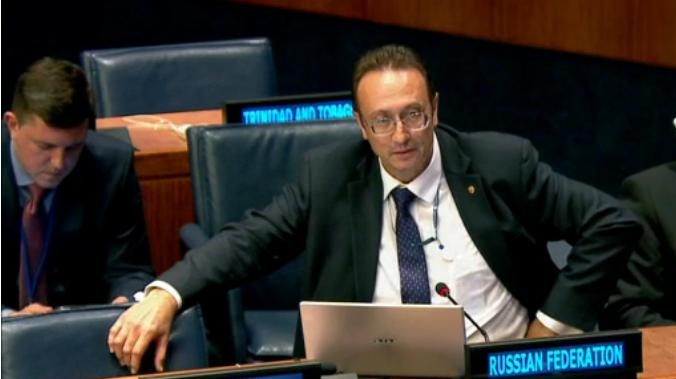Statement by the representative of the Russian Federation to the First Committee of the 72nd session of the UN General Assembly Vladimir Yermakov in the First Committee on “Regional disarmament and security” cluster
Mr. Chair,
In the regional we attach particular importance to Europe. We all live in this house and who else if not us will work on crafting of an architecture based on equal and indivisible security for all and free of any artificial division lines.
Being consistent in advocating for maintaining peace, Russia presented a draft Treaty on comprehensive European security to substitute the outdated CFE Treaty that reflected the bloc-to-bloc thinking. However, our partners on the European Continent appear not be ready for this substantial work so far.
Instead, NATO has accelerated its reckless expansion to the East by building up its military infrastructure near Russia’s borders, including deployment of the elements of the US global BMD. Direct interference by the West into the internal affairs of Russia’s neighboring countries, regime change by anti-constitutional methods, including use of force, and relying on strength when talking to us have become a daily practice. The historical chance to improve the situation in Europe has been missed. The consequences are well-known to everyone.
Despite all these negative developments, we believe that there is no and cannot be an alternative to politico-diplomatic solution to all accumulated problems.
Proceeding from this understanding, we have supported the German initiative to launch “a structured dialogue” on the European security issues in the OSCE region. The format could contribute to easing tensions and restoring mutual trust.
Let’s begin with the basics and put aside any unsubstantiated accusations and belligerent rhetoric. Launching an equality-based depoliticized dialogue would pave the way for engaging military experts into this process. Their participation would allow to start consideration of existing concerns, to discuss measures to prevent dangerous military incidents and to begin on this basis the elaboration of specific de-escalation measures primarily in the contact zone between Russia and NATO.
Initial discussions in the framework of the “structured dialogue” give some room for hope. We note positive signs in the approach of European experts when they meet representatives of the Russian Ministry of Defense, their gradual shift from blatant accusations against Russia and their readiness to interact. It is essential to join efforts in strengthening the trend toward normalizing relations including in the military sphere.
The OSCE Forum for Security and Cooperation (FSC) could become the best possible platform for promoting dialogue. However, its potential is still being weakened by the unilateral actions of NATO that has broken off its military cooperation with Russia. The attempts of some countries to keep afloat the anti-Russian rhetoric at any cost are not instrumental for restoring the work-conducive environment either.
The Russian Presidency at the Forum (from April till August 2017) did its best to contribute to normalizing the situation. Our delegation focused on the issues of common interest for all States. Those are combating illicit SALW trade, arms export controls, exchange of experience on elimination of conventional munitions, and implementation of bilateral agreements on the prevention of incidents in the air and at sea.
The Open Skies Treaty (OS) remains an important confidence-building measure.
However, the coup d’etat in Kiev was followed by absolutely unjustified claims against Russia on alleged armed forces concentration near the Russia-Ukraine border. On our part we demonstrated unprecedented transparency by allowing all OS State Parties wishing to do so to conduct almost two dozens observation flights in that area. At the request of the Kiev authorities in March 2014 Russia also permitted an additional extraordinary observation mission. The observation flights convincingly testified that all allegations against Russia had been totally groundless. However, the decoded snapshot materials in particular those of the flight mission conducted by Kiev for some reasons have not received a lot of coverage by our Western partners. We have an impression that they have preferred to keep silence.
Since the unjustified accusations of Russia have continued, we organized on the margins of the Vienna-based Forum our own presentation on the results of processing the copies of photographs obtained during the completed missions and, based on their comparison with data obtained over the same sites one year earlier and factual materials, we totally refuted all Western allegations.
Thus, yet another shameful attempt of anti-Russian hysteria has failed miserably. We very much regret that our Western partners as unreasonable children are continuing the “witch hunt” whilst the real threats from a totally different side have long and quite persistently been knocking on the door of their fragile house.
